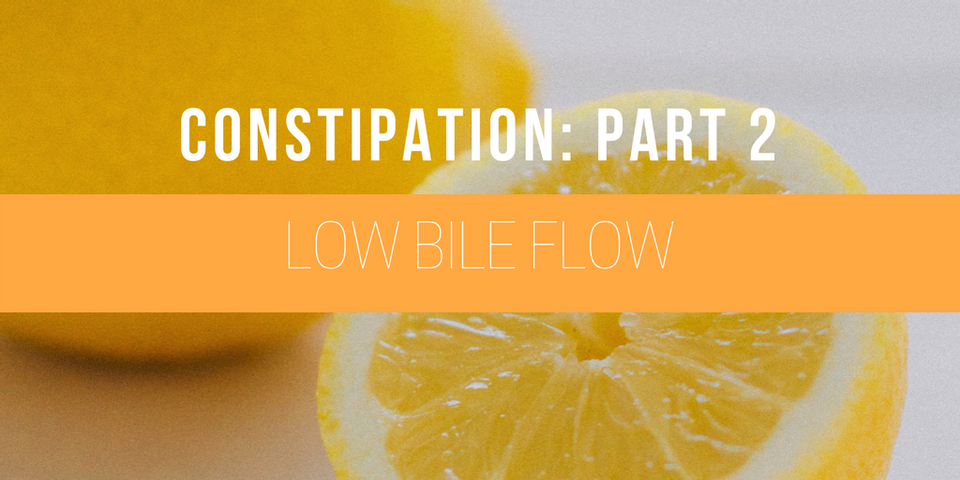Your Complete Guide to Causes of Constipation and Finding Relief – Part 2: Low Bile Flow

Constipation is incredibly uncomfortable for those who suffer from being stopped up. Often you feel uneasy, bloated, full, as though everything isn’t coming out, and even nauseous.
But constipation is more than discomfort. Stool that doesn’t pass fully through the digestive system actually rots and prevents absorption of nutrients from new food. Defined as fewer than three stool movements a week, it’s the most common gastrointestinal problem in the United States.
When you’re suffering from constipation, it seems easy to take over-the-counter laxatives or stool softeners – but you’d just be treating the symptom, not the underlying cause.
If you only treat the symptoms, you might continue to struggle with constipation for the rest of your life. How to get rid of constipation depends on the underlying causes, which we aim to help you identify in this guide.
In this six-part series, we are looking at the different causes of constipation in an effort to find you true constipation relief. In the first part, we discussed low hydrochloric acid or stomach acid levels, an often-overlooked cause of constipation.
In part two of this series, we are going to take a closer look at low bile flow, what causes it, and what helps constipation caused by low bile levels.
What Causes Constipation – Part 2: Low Bile Flow
Bile is a digestive fluid created by your liver and stored in your gallbladder. Bile is important in digestion and absorption of fat in the small intestine. Bile’s makeup includes:
-
Water
-
Bile acids (also called bile salts)
-
Bilirubin
-
Fats (cholesterol and fatty acids)
Fat is digested differently than carbohydrates and proteins, it requires the help of bile to break it down after it passes through the stomach. When fat reaches the small intestine, it looks like large fat droplets. Your bile then breaks down these large fat droplets, with bile salts, which emulsifies (breaks) them into fatty acids and monoglycerides. These particles are then small enough to pass through the intestine wall. Bile is also important in breaking down bilirubin (old blood cells byproduct) and cholesterol.
When your liver isn’t producing enough bile or it is too thick to flow freely (peanut butter vs water-like) fat can build up in the intestinal wall and cause slower movements via digestive tract therefore cause constipation. If your constipation is due to low bile flow, symptom treating medications won’t help you in the long run. Identifying low bile flow as the cause of your constipation brings you one step closer to lasting relief.
The Importance of Bile Flow
Why is bile so important? Bringing to mind a yellowish, green slime, it’s a common reaction to think of bile as vile, but it’s critical to gut health and smooth digestion. Bile is important in a number of critical roles, including:
-
Aid in fat digestion and absorption (and some digestion of proteins and starches)
-
Emulsify fats (the detergent-like reaction done by bile salts)
-
Assist in absorption of fat-soluble substances, such as vitamins A, D, E, and K
-
Helps regulate your intestinal microflora
-
Encourages fecal matter movement through your digestive tract
-
Help your liver rid your body of waste products
-
Aid in destroying unwanted organisms that invade the body through the digestive system
When your body isn’t making enough bile, you can experience several uncomfortable and sometimes painful symptoms, such as:
-
Fatigue
-
Mood swings
-
Constipation
-
Acid reflux
-
Acne
-
Gastro-Esophageal Reflux Disease (GERD)
-
Gall bladder disease (stones and inflammation)
-
Migraines
-
Jaundice
-
Poor gut microflora
-
Impaired liver function
-
High cholesterol
-
Greasy, foul smelling, and light colored stools
If your body has low bile flow, your constipation is also probably contributing to nutritional deficiencies, even if you’re eating healthy. This is why it’s so important to find the cause of your constipation instead of reaching for a quick fix.
Nutritional deficiencies can lead to conditions that may appear unrelated to your constipation. If you experience regular constipation it’s important that you share that information with your functional medicine doctor.
Causes of Low Bile Flow
Since bile is produced in the liver, any impairment to the liver can cause low bile flow. Impairments of the liver include:
-
Jaundice
-
Bleeding in the liver
-
Infection of the liver
-
Liver inflammation
-
Vitamin D deficiency
Additionally, because bile is stored in the gallbladder, any impairment of the gall bladder could lead to low bile flow, including:
-
Gallstones
-
Cholecystitis
-
Gallbladder cancer
-
Gallbladder polyps
-
Abscess
Other causes of low bile flow could include:
-
Obesity
-
Having a high-cholesterol diet
-
Diabetes
-
Old age
If you suspect you are suffering from constipation caused by low bile flow, it should be taken very seriously – schedule an appointment with a certified functional medicine doctor to get your constipation cause pinned down and be on your way to smooth digestion.
Home Remedies for Constipation Caused by Low Bile Flow
Remember, what helps constipation best is determined by the underlying cause. With that in mind, there are several natural remedies for constipation caused by low bile flow that you can take at home, including:
-
Lemon juice – Lemon juice activates the liver and stimulates digestion. Try this in warm water on an empty stomach in the morning.
-
Healthy, raw oils – Fish oil, olive oil, flaxseed oil, nuts, seeds, and avocados are good sources.
-
Promote good gut health – By reducing sugar, processed foods, and grains you’ll be encouraging a healthy gut.
-
Foods believed to stimulate bile production – Add garlic, beets, radicchio, kale, endive, arugula, celery, and radish to your diet.
There’s also Betafood and Cholachol, two additional natural remedies that your functional medicine doctor may recommend.
-
Betafood** – This is an extract derived from organic beet root and tops. It mobilizes the bile and transforms it from a thick, peanut butter consistency, to a water-like consistency.
With as much as 10 percent of the population suffering from gallstones, this is a great supplement that helps prevent and reduce gallstones and aid in fat metabolism.
-
Cholacol** – These are purified bile salts, which are great for stasis and gallbladder relief. If you’ve had your gallbladder removed, these are a necessity. You’re missing the bolus bile release that occurs during normal food digestion. Those without a gallbladder suffer from fat digestion and therefore lack nutrients that are fat absorbent such as vitamin A, K, D, and E (and many others).
If you’ve had your gallbladder removed (cholecystectomy) and were left disabled in your ability to digest fats and other nutrients, you are not alone. Every year about 700,000 people have their gallbladder removed and require purified bile salts to aid in normalizing digestion.
These foods and supplements are a great way to start supporting your bile production. Be sure to see your functional medicine doctor in the early stages of your constipation issues. By seeing your doctor when constipation starts, prevents low bile production from going untreated and potentially leading to a cascade of conditions.
**To order these products you can call our office at 212-696-HEAL(4325)
When to See Your Functional Medicine Doctor for Constipation
As with many conditions, treating symptoms ignores the underlying cause. Additionally, waiting to see your doctor about your constipation can make diagnosis more difficult and the treatment more complicated. If you experience constipation that lasts longer than a couple of weeks, it’s time to schedule an appointment with your functional medicine doctor.
By working closely with a functional medicine doctor, you can discover constipation remedies that helps stimulate bile production and relieve your constipation discomfort for good.
Elena Klimenko, MD, a certified functional medicine physician, will help you choose the right course of action to identify the root cause and relief your unsettled symptoms. Call today to find out more about functional medicine and speak with Dr. Klimenko at 212-696- HEAL(4325).
If you want more information about Functional Medicine, contact us to receive a FREE copy of Dr Klimenko’s E-book.
About the Business
Have a question? Ask the experts!
Send your question

